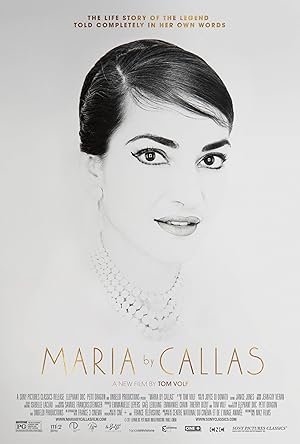Pick a famous person. Now get every clip, interview or performance of that person, but don’t necessarily sync the audio to the visual and edit down to a feature length documentary. If this kind of documentary sounds appealing to you, then I would definitely urge you to see Maria By Callas, but I don’t consider it a documentary that I want to see so I wasted good money and time to sit in the theater feeling as if I was held hostage for one hour fifty-three minutes. I even considered leaving early in the film, but I thought that at some point, the film would cohere into an appealing narrative. It did not. I should have left.
Everyone else around me clearly disagreed, but they also thought they were in their living room and talked loudly to each other throughout the whole film. I actually don’t mind if people talk during a movie if the comments are incisive and enhance the theatrical experience, but the comments were loud enough to be disruptive, but too low to be intelligible and when I could hear them, they were recollections. Dreadful audience for a dreadful movie. I think that the filmmakers banked on exploiting nostalgia, and that audiences would be delighted to simply remember and experience Maria Callas’ voice in a theatrical setting with the thinnest thread of insights into her life story. Maria By Callas limits itself to only using her voice to tell her story. I suppose that I should have paid closer attention to this premise because I found it too restrictive. While I am familiar with the titular figure, I am not such a fervent follower that I don’t need more exploration and explanation about the information presented.
Limiting a documentary about a famous person to what that person was willing to share or what is available to the public makes Maria By Callas a dissatisfying viewing experience. Here is what we discover. She had a stage mom and missed her carefree childhood. She was an ideal student. She had health problems. Her employer fired her. Critics treated her unfairly. Her husband was exploitive and cared more about her fame than her unlike Aristotle Onassis, who is just her friend, but really is the love of her life. Oops, Onassis broke her heart. Whenever her personal life is going well, she doesn’t want to work, but when it isn’t, she needs to work. She likes dogs, and she was a looker. We get plenty of amazing vocals over her stepping out on the red carpet at premieres or arriving at airports or her standing on stage, but the stage footage rarely matches the audio. It is infuriating.
I wanted more context and critical thinking from Maria By Callas. Show me the neighborhood that she was brought up in. Did she stop talking to her mother after she got married? How did she meet her husband? Interview her friends and family. Show a complete performance of a song earlier in the proceeding, ideally one with cast mates and the other by herself so we can get a sense of her acting instead of constantly being told that she was a good actor. Were her health problems an excuse or a legitimate concern? If the latter, have a professional or a close associate elaborate on the pain that she had to endure. She died early so there was a missed opportunity to discuss a current problem of doctors not taking pain experienced by women and minorities seriously. When she gets fired, was it atypical or shocking? Compare and contrast what she was expected to do with how opera singers were usually expected to perform. She seems to be best known for her performances in Norma. Why was that her iconic performance? Give us a little background on the operas and why she made them special until she reached paparazzi levels of fame. Was she the first of her kind? Who were her chief competitors?
Please let me be clear. It isn’t that I don’t believe Maria Callas’ account of her life, but any recorded account of anyone’s life is inadequate if you want a full understanding of who they were in a specific time and place to completely understand them. I’m not comparing Whitney Houston to Maria Callas, but I was alive at the height of Houston’s fame and while I certainly saw Whitney in theaters out of nostalgia and to get another chance to hear her voice in a theatrical setting, I also left with a deeper appreciation than what I arrived about how unique she was and how she was influenced by different factors and her historical significance.
I wanted to learn more about the opera sensation, but Maria By Callas is no documentary for a viewer unfamiliar with her. I like opera, and I like learning about strong women. I came eager to learn more about her, but at the end of the credits, I was only eager to leave the theater and run to the lavatory without giving her a second thought. I’m not sure how long it will take before I will be willing to revisit her story without fear of wasting my time. I did note the filmmaker’s name so I will never make the same mistake again and see any of his future films because this documentary was nothing more than a poorly edited press junket with fleeting moments of intimacy.
Stay In The Know
Join my mailing list to get updates about recent reviews, upcoming speaking engagements, and film news.





